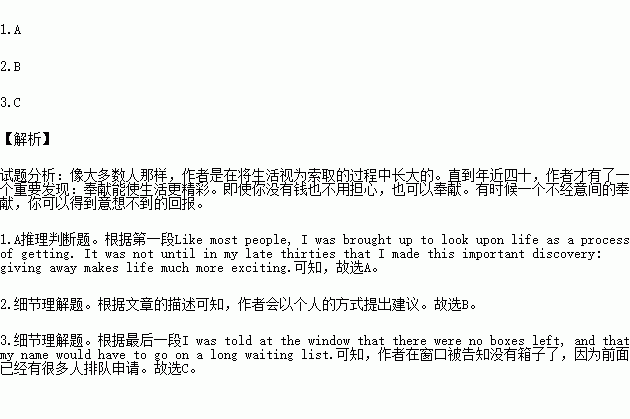题目内容
Like most people, I was brought up to look upon life as a process of getting. It was not until in my late thirties that I made this important discovery: giving away makes life much more exciting. You need not worry if you lack money.
This is how I experimented with giving away. If an idea for improving the window display of a neighborhood store flashes to me, I step in and make the suggestion to the storekeeper. One discovery I made about giving away is that it is almost impossible to give away anything in this world without getting something back, though the return often comes in an unexpected form.
One Sunday morning, the local post office delivered an important special delivery letter to my home, though it was addressed to me at my office. I wrote the postmaster a note of appreciation. More than a year later I needed a post office box for a new business I was starting. I was told at the window that there were no boxes left, and that my name would have to go on a long waiting list. As I was about to leave, the postmaster appeared in the doorway. He had overheard(无意中听到) our conversation. “Wasn't it you that wrote us that letter a year ago about delivering a special delivery to your home?” I said yes. “Well, you certainly are going to have a box in this post office if we have to make one for you. You don't know what a letter like that means to us. We usually get nothing but complaints.”
1.From the passage, we understand that ________.
A. the author did not understand the importance of giving until he was in late thirties
B. the author was like most people who were mostly receivers rather than givers
C. the author received the same education as most people during his childhood
D. the author liked most people as they looked upon life as a process of getting
2.The author would make the suggestion to the storekeeper ________.
A. in writing
B. in person
C. in the window display
D. about the neighborhood
3.When the author needed a post office box, ________.
A. he had put his name on a waiting list
B. he wrote the postmaster a note of appreciation
C. many people had applied for post office boxes before him
D. he asked the postmaster to make one for him
 文敬图书课时先锋系列答案
文敬图书课时先锋系列答案
